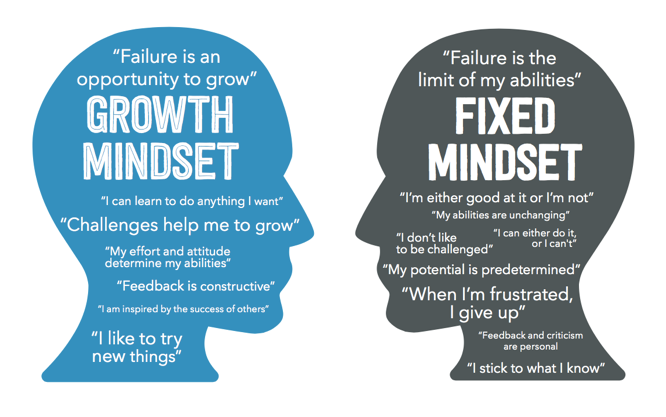Encapsulating the Theory and Application of Managerial Communications, In my opinion, is the ability to have a growth mindset. In order to have a growth mindset, you are continuously challenged to apply the characteristics of a good communicator, while focusing on improving your management/leadership skills. A manager with he growth mindset, has the ability to think multi-dimensionally, because they can find the positive in every scenario, as well as always finding room for improvement. Like Lowe's, a manager with the growth mindset, "Never Stops Improving".
What are these two mindsets?

According to Carol Dweck, the founder of this theory:
The growth mindset is "founded on the belief that your basic qualities are cultivable and flexible things that can grow with dedication, time, and a commitment to getting better, smarter, and more talented" (Dweck, 2006).
On the contrary the fixed mindset, "assumes that our character, intelligence, and creative ability are static givens which we can’t change in any meaningful way, and success is the affirmation of that inherent intelligence, an assessment of how those givens measure up against an equally fixed standard; striving for success and avoiding failure at all costs become a way of maintaining the sense of being smart or skilled" (Dweck, 2006).
Why is the Growth Mindset Better?
Those who are focused on improving, worry less about looking smart because they are putting their energy into learning. According to Carol Dweck in a Harvard Business Review article that she authored, "When companies embrace a growth mindset, their employees report feeling far more empowered and committed; they also receive far greater organizational support for collaboration and innovation" (Dweck, 2016)
In opposition, "people at primarily fixed-mindset companies report more of only one thing: cheating and deception among employees, presumably to gain an advantage in the talent race" (Dweck, 2016)
By just adopting a growth mindset, better things will happen. According to Dweck, "Organizations that embody a growth mindset encourage appropriate risk-taking, sowing that some risks won't work out" (Dweck, 2016) This is important because turning knowledge into action in a quicker cycle, requires risk taking, and trial and error is important for a company to grow.
Aiding in building an innovative culture, a company with a growth mindset rewards employees for important and useful lessons learned, even if things didn't work out. This fosters creativity, and employees won't walk around on eggshells, afraid of getting in trouble.
The growth mindset supports collaboration across organizational boundaries rather than competition among employees or units. Again, reinforcing the goals of successful managerial communication.
According to Dweck, managers with a growth mindset, are committed to the growth of every member, not just in words but in deeds, such as broadly available development and advancement opportunities, and they continually reinforce growth mindset values with concrete policies" Dweck, 2016).
In the Marine Corps, a positive mental attitude went a long way. A positive mental attitude was not only rewarded, but it improved your shooting. By blocking out negative thoughts, and focusing on positive ones, your shots would magically become more accurate. Same should apply to management, focus on the positive aspects of every scenario.
Dweck, C. (2006). Retrieved from https://careersinpsychology.org/fixed-vs-growth-mindset-success/
Dweck, C. (2016). What Having a “Growth Mindset” Actually Means. Retrieved from https://hbr.org/2016/01/what-having-a-growth-mindset-actually-means
No comments:
Post a Comment